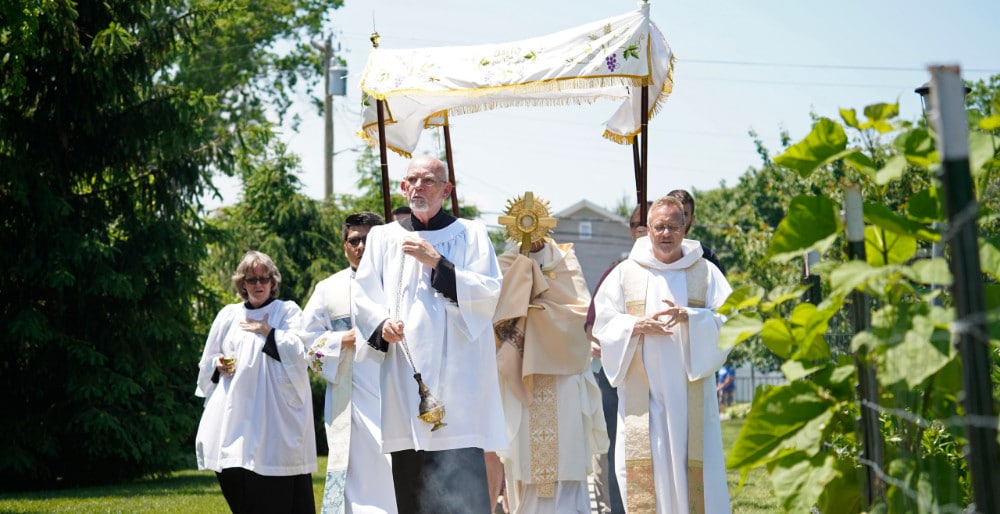St. John Paul II said it plainly enough: “The Church draws her life from the Eucharist” (Ecclesia de Eucharistia, No. 1). This is true. The Eucharist is what makes the Church the Church. And such is what we celebrate on the solemnity of Corpus Christi — namely, that it’s not we who make the Church but Christ in mystery, in sacrament — in his body and blood present upon every Catholic altar.
It’s the Catholic difference. If somehow a first-century Christian traveled through time to the 21st century and went looking for other Christians, it wouldn’t be until that time-traveling Christian found people gathered around a table with bread and wine on it that he or she would know they had found fellow believers in Christ. The music wouldn’t give it away, nor hands in the air, not even speaking in tongues (pagans did that, too); no, what would give it away that we were Christians would be that we celebrated the Eucharist, that the bread and wine on our altars we believed becomes body and blood. That’s what we mean by saying the Church draws life from the Eucharist, that it’s the “source and summit” of our faith. Because the Eucharist makes us what we are, the Church of Jesus Christ.
| June 19 – The Solemnity of the Most Holy Body and Blood of Christ |
|---|
|
Gn 14:18-20 |
But why? The answer is simple: Because God feeds his people, always has. On Mount Sinai, God fed the elders of Israel. Mysteriously, it says, they ate and drank and saw God (cf. Ex 24:11). This was the same God that had fed them all along with manna and quail and water from the rock (cf. Ex 16-17). This was also the God whom David praised in song for setting a table in the wilderness, feeding his chosen people even in danger, in the midst of enemies (cf. Ps 23:5). It’s a primeval experience of faith, that our God feeds us. And it’s also why, when Jesus started miraculously feeding his disciples, they recognized these miracles for the Godlike signs they were. They knew God is a God who feeds, and so when the Son who said he was one with the Father also fed them, they knew they were in God’s presence. They knew what this Eucharist meant.
Which is the tradition Paul handed on to the Corinthians. And it’s exactly the same tradition that bears for us faith in the grace God still offers us in the Eucharist. God fed his people in the desert. God feeds us still today. One simply needs to know where God is offering this food — in the nearest parish, wherever there are Christians gathered around an altar, where bread and wine become body and blood.
And think of this feast in relation to the others, what the liturgical cycle is teaching us. This Christ we’ve followed since Christmas, now risen and ascended: We know that by the Spirit given at Pentecost he remains present to the Church. And we know by light of the dogma of the Trinity that since the Son is God and the Spirit is God, each mysteriously one God with God the Father, that our encounter with Christ in the Spirit is truly an encounter with God himself, that God is truly with us. And what’s even more amazing (and this is what Corpus Christi teaches us, following, as it does, Trinity Sunday) is that this God we encounter humbles himself enough that he places himself in our hands and on our tongues. Simply because he’s a God that wants to be with us, to feed us.
See the closeness of God in Catholicism! This is what we celebrate at Corpus Christi. This is how all we’ve heard and believed about the Scripture and about Christ actually touches us — in the bread and wine that become true body and true blood. It is the most amazing thing! May you recognize that it is so. And may it change you — this divine food.
Father Joshua J. Whitfield is pastor of St. Rita Catholic Community in Dallas and author of “The Crisis of Bad Preaching” (Ave Maria Press, $17.95) and other books.





